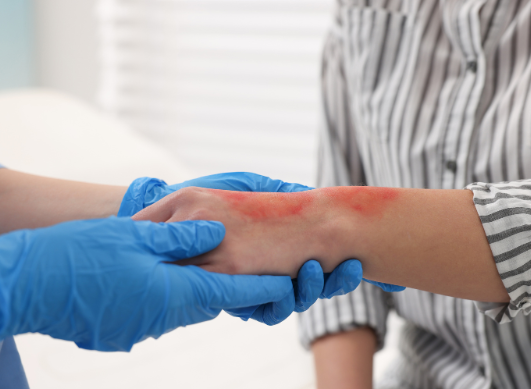- Home
- Forums
- General forums
- News from the media
- Eating out increases exposure to 'hormone disruptors'
Eating out increases exposure to 'hormone disruptors'
- 21 views
- 0 support
- 1 comment
All comments

lesmal
Ambassador
10/04/2018 at 17:41
Good advisor
![]()
lesmal
Ambassador
Last activity on 13/01/2026 at 17:51
Joined in 2018
1,535 comments posted | 50 in the News from the media group
82 of their responses were helpful to members
Rewards
-
Good Advisor
-
Contributor
-
Messenger
-
Committed
-
Explorer
-
Evaluator
Thank you for this very informative article!
It is essential that people are made aware of all aspects of 'eating out'.
Les
See the signature
Les
Give your opinion
Articles to discover...
Subscribe
You wish to be notified of new comments
Your subscription has been taken into account








Margarita_k
Good advisor
Margarita_k
Last activity on 07/10/2020 at 11:39
Joined in 2016
1,195 comments posted | 154 in the News from the media group
2 of their responses were helpful to members
Rewards
Good Advisor
Contributor
Messenger
Committed
Explorer
Evaluator
Many of us enjoy the occasional meal in a restaurant. Some of us might even indulge in the occasional fast food meal (I won't tell). However, new research might make you think twice about nipping out for a quick lunch.
When we read about the health consequences of eating out, it tends to involve obesity, heart disease, diabetes, and the like.
But the latest study provides us with an entirely new reason to worry (as if we needed any more).
The paper — which is now published in the journal Environment International — introduces a new concern to the dinner plate. It comes in the shape of a difficult-to-pronounce chemical: phthalates.
What are phthalates?
Phthalates are a group of chemicals commonly found in food packaging and other materials used in food processing. They are often added to plastics to increase their flexibility, durability, and transparency.
Basically, if you manufacture plastics, you love phthalates; they're incredibly useful. Color- and odorless, they ensure that a plastic product continues to do its job for up to 50 years.
But, all that glitters is not gold; phthalates have the potential to cause upheaval in the human body.
In particular, phthalates are thought to disrupt hormones. While the exact effects of long-term exposure are unclear, they seem to negatively impact the reproductive system of animals and possibly humans.
Because phthalates have the potential to interfere with metabolic processes, some scientists have even wondered whether they might play a role in the current obesity epidemic.
However, more research will be needed before phthalates take any blame for that particular public health tsunami.
The latest study to investigate phthalates in humans was led by Ami Zota, an assistant professor of environmental and occupational health at the George Washington University in Washington, D.C., and Julia Varshavsky, Ph.D., from the University of California, Berkeley School of Public Health.
In a previous study, the same team of phthalate investigators found that those who ate the highest quantities of fast food had phthalate levels up to 40 percent higher than those who ate fast food less frequently.
For their next foray into food chemicals, the scientists cast their net a little wider; they assessed whether eating out in general (not just fast food) would have the same impact.
They took data from the National Health and Nutrition Examination Survey, which were collected in 2005–2014. In all, the 10,253 participants were asked about their food consumption in the past 24 hours — more specifically, whether it had been home-cooked or eaten out.
Eating out and phthalates
This study is the first to compare phthalate exposure in people who dine out and those who eat home-cooked meals. And, I am sad to report, the findings are a little concerning.
Individuals who reported consuming more restaurant, cafeteria, and fast food meals had phthalate levels almost 35 percent higher than people who mostly ate food purchased from a grocery store.
Zota explains, "This study suggests food prepared at home is less likely to contain high levels of phthalates, chemicals linked to fertility problems, pregnancy complications, and other health issues."
Overall, 61 percent of participants had eaten out the day before they completed the questionnaires.
And, perhaps most worrying, although the links between eating out and phthalate exposure were significant in all age groups, the most robust links were found in teenagers. Adolescents who regularly ate out had 55 percent higher phthalate levels than people who ate at home.
So, potentially, at a time when hormones are at their busiest, phthalate levels are at their highest.
Bad news for burger lovers
In particular, cheeseburger and other sandwich eaters seem to pay the heftiest toll. Burgers and sandwiches purchased from cafeterias, restaurants, or fast food outlets were associated with 30 percent higher phthalates in people of all ages.
"Pregnant women, children, and teens are more vulnerable to the toxic effects of hormone-disrupting chemicals, so it's important to find ways to limit their exposures."
Because so many people eat out regularly, these results are worrisome, to say the least. So, where do these pesky phthalates come from?
Unfortunately, there are many ways that they may find their way into your burger. For instance, they are present in takeout boxes, plastic gloves, and a range of food processing equipment that might be used at restaurants.
What should we do? The answer, according to Zota, might be relatively simple: "Preparing food at home may represent a win-win for consumers. Home-cooked meals can be a good way to reduce sugar, unhealthy fats, and salt."
"And," she continues, "this study suggests it may not have as many harmful phthalates as a restaurant meal."
If the results are replicated and the relationship between eating out and phthalates is confirmed, new policy may need to be introduced to protect consumers.
MedicalNewsToday